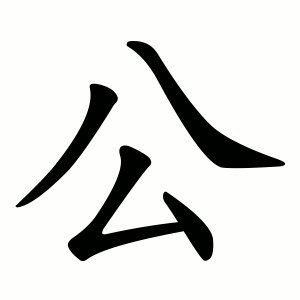公
- fair;
- impartial;
- public;
- official;
- common;
Etymology
Pictophonetic/associative compound:
Early forms show 八 (“to divide, to separate”) above 厶 (“private, personal”). Together they signify “what is not private → what is common, public, fair.”
Thus, 公 originally contrasted with 私 (“private”), carrying the sense of impartiality, fairness, openness, and by extension, “official, public.”
Usage in Korean
公平 (공평) — fairness, impartiality
公正 (공정) — just, righteous
公務 (공무) — public duty, official affairs
公共 (공공) — public, communal
公園 (공원) — public park
公文 (공문) — official document
公認 (공인) — official recognition, authorization
Additional notes
In classical Chinese thought, 公 often embodies the Confucian ideal of justice without bias, contrasted with 私 (private interest, selfishness).
The title 公 was also a noble rank in ancient China (equivalent to “duke”).
In modern East Asian languages, 公 appears in countless compounds meaning “public” or “official,” and it remains central to ideas of fairness and the common good.
Words that derived from 公
- 공(公)–public affairs; being public
- 공공(公共)–being public
- 공무(公務)–public duties; official duties; government affairs; public affairs
- 공무원(公務員)–civil servant
- 공산(公算)–chance
- 공식(公式)–being official; being state; formula
- 공연(公演)–performance; show
- 공연장(公演場)–theater
- 공원(公園)–park
- 공유(公有)–public ownership
- 공작(公爵)–duke
- 공적(公的)–public; official
- 공전(公轉)–rotation
- 공주(公主)–princess
- 공중(公衆)–public; public use
- 공중전화(公衆電話)–pay phone
- 공평(公平)–fairness
- 공표(公表)–announcement
- 공휴일(公休日)–public holiday
- 국립 공원(國立公園)–national park
- 주인공(主人公)–main character; leader; hero; winner; owner
- 金戈 (CI)
- ⿱ 八 厶
